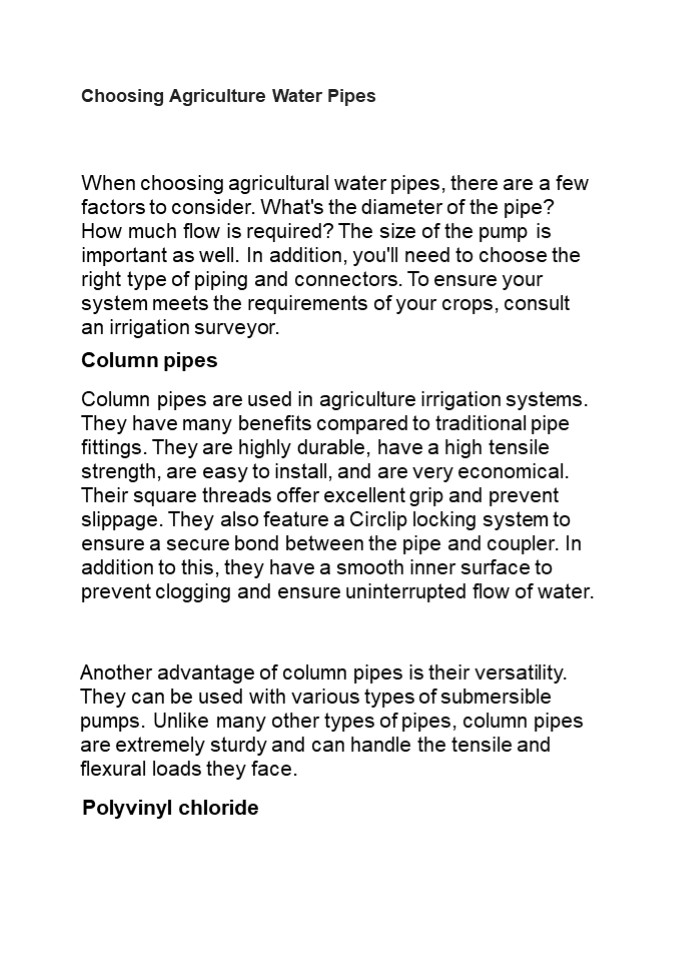hdpe pipe suppliers delhi ncr - PowerPoint PPT Presentation
Title:
hdpe pipe suppliers delhi ncr
Description:
HDPE Pipes Installation are easier to handle and ship over long distances due to the intrinsic flexibility, which makes hauling and shipping easier. This feature allows for simpler installation. Read More:- – PowerPoint PPT presentation
Number of Views:1
Title: hdpe pipe suppliers delhi ncr
1
Choosing Agriculture Water Pipes
When choosing agricultural water pipes, there are
a few factors to consider. What's the diameter of
the pipe? How much flow is required? The size of
the pump is important as well. In addition,
you'll need to choose the right type of piping
and connectors. To ensure your system meets the
requirements of your crops, consult an irrigation
surveyor. Column pipes Column pipes are used in
agriculture irrigation systems. They have many
benefits compared to traditional pipe fittings.
They are highly durable, have a high tensile
strength, are easy to install, and are very
economical. Their square threads offer excellent
grip and prevent slippage. They also feature a
Circlip locking system to ensure a secure bond
between the pipe and coupler. In addition to
this, they have a smooth inner surface to prevent
clogging and ensure uninterrupted flow of water.
Another advantage of column pipes is their
versatility. They can be used with various types
of submersible pumps. Unlike many other types of
pipes, column pipes are extremely sturdy and can
handle the tensile and flexural loads they face.
Polyvinyl chloride
2
The demand for polyvinyl chloride for agriculture
water pipes is booming. These pipes are used for
irrigation of crops and in some cases, to put
pesticides and fertilizers into the soil. The
growing population in many countries around the
world is increasing the demand for water and the
demand for PVC pipes.
PVC pipes are lightweight, flexible, and
corrosion-resistant. They can be easily molded
and are inexpensive to install. This material is
ideal for agricultural water pipes. They are
widely used for drip irrigation systems,
pesticide spraying systems, and connecting the
water mains to crop fields.
The PVC industry has worked with regulatory
agencies to improve the safety and sustainability
of the product. The use of plasticizers and
chlorine in the production of PVC brought a lot
of scrutiny, but those concerns have been
addressed and the use of phthalates has been
banned in many regions. In addition, lead-based
stabilizers in vinyl compounds have been phased
out in Europe due to the risk they pose for
health. Heavy metals in PVC are also an issue,
and the PVC industry works with environmental and
government agencies to minimize waste disposal.
HDPE
3
HDPE agriculture water pipes are available in a
variety of sizes and pressure gauges. They are
made from high density polyethylene and are
durable and resistant to corrosion. These pipes
are ideal for irrigation and storage and
conveyance water schemes. In addition, they are
lightweight. They can be bent to nearly any
radius.
Another advantage of HDPE pipes is that they can
be joined by butt welding, electrofusion welding,
socket welding, or extrusion welding. The heat
generated during the joining process creates a
seamless, homogenous joint that is stronger than
the old pipe. In contrast, PVC pipes are commonly
joined using jointing chemicals and rubber seals,
which can lead to environmental health concerns
and increase the chance of pipe failure over
time. Plus, PE pipes are less susceptible to root
intrusion, ensuring integrity in a variety of
soil conditions.
HDPE pipes suppliers Delhi uses polyethylene
resin. This resin is heated and then extruded
through a die. A combination of die size, screw
speed, and haul-off tractor speed determines the
diameter of the pipe. Polyethylene pipe is
typically black in color. The material contains
three to five percent carbon black, which creates
an effective UV-resistant material. Other colours
are also available, but they are less common.
4
Solvent cement joints Solvent cement joints for
agriculture water pipes are used for a variety of
applications, including irrigation, sewage, and
potable water. The solvent cement is available in
different categories, depending on the type of
application and pipe diameter. It is important to
use the right solvent cement for the application.
Engineers should follow the manufacturer's
recommendations.
Solvent cement joints are used to create
pressure-tight, permanently sealed joints. The
process involves preparing the joint with primer,
and applying solvent cement to the pipe. Then,
the pipe should be placed into a fitting socket.
Field drainage Agriculture water pipes are a
simple way to improve soil drainage. They are
generally installed in a trench about two to four
feet below the surface of the land. The pipes
allow groundwater to flow in the path of least
resistance and thus lower the groundwater table,
allowing fields to drain earlier in the spring.
These pipes are typically installed at a slope
between zero and one percent and are oriented to
discharge into a nearby stream or ditch.
Agriculture water pipes are used for irrigation,
which helps improve water quality and crop yield.
This is an economical method if fields need to be
drained.
5
However, it requires additional infrastructure
such as a pumping system and a wetland for water
treatment. In some regions, a combination of a
wetland and subirrigation is used. This method
has been proven to increase yields and reduce the
impact on water quality due to irrigation. It can
be expensive, however, due to the amount of land
needed for the wetland.































